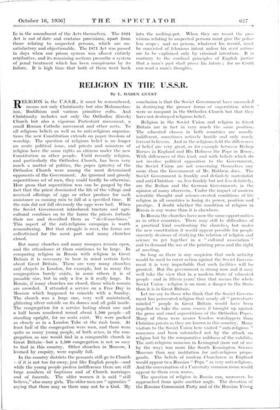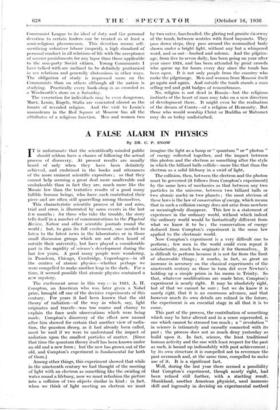RELIGION IN THE U.S.S.R.
By L. HADEN GUEST
ELIGION in the U.S,S.R., it must be remembered, - 'means not only Christianity but also Muhamedan- ism, Buddhism and various primitive cults. And Christianity includes not only the Orthodox (Greek) Church but also a vigorous Protestant movement, a small Roman Catholic movement and other sects. To all religious beliefs as well as to anti-religious organisa- tions the new Constitution extends on paper freedom of worship. The question of religious belief is no longer an acute political issue, and priests and ministers of religion have the same rights as citizens under the new Constitution as other people. Until recently religion, and • particularly the Orthodox Church, has been very much a matter of politics, the popes '(priests) of the Orthodox Church were -among the most determined opponents of the Government. An ignorant and grossly superStitious set of men, they could hardly be otherwise. How gross that superstition was can be gauged by the fact that the priest dominated the life of the village and received offerings of eggs or other produce for such assistance as causing rain to fall at a specified time. If the rain did not fall obviously the eggs were bad. When the Soviet Government introduced tractors and agri- cultural combines on to the farms the priests forbade their use and described them as "devil-machines." This aspect of the anti-religious campaign is worth remembering. But that struggle is over, the farms are collectivised for the most part and many churches closed. - But many churches and many mosques remain open, and the attendance at them continues to be large. In comparing religion in Russia with religion in Great Britain it is necessary to bear in mind certain • facts about 'Great Britain. There are very many churches and chapels in London, for example, but in many the congregation . barely exists, id some others it is of passable' Size, kit in only a few is it really large. In RUSSia,..if 'Many churches are closed, those which remain are crowded. I attended a service on a Free Day in Moscow which happened to coincide with a Sunday. The church was a large one, very well maintained, glittering silver outside on its domes and all gold inside. The congregation for a service lasting about one and a half hours numbered round about 1,500 people—all standing upright, for no seats exist. We were packed as closely as in a London Tube at the rush hour. At least half of the congregation were men, and there were quite as many young people, of both sexes, in the con- gregation as one would find in a comparable church in Great Britain—but a 1,500 congregation, is not so easy to find in this country. Other churches in Moscow, I learned by enquiry, were equally full.
In the country districts the peasants still go to Church —if it is not too far away, just like English people—and while the young people profess indifference there are still large numbers of baptisms and of ,Church marriages and of funerals. The older women it is said "still believe," also many girls., The older men are "agnostics" saying that there may or there may not' be a God. My conclusion is that the Soviet Government have succeeded in destroying the grosser forms of superstition which were so rampant in the Orthodox Church but that they have not destroyed religions belief.
Religion in the Soviet Union and religion in Great Britain are in fact in very much the same position. The educated classes in both countries arc usually indifferent, sometimes actively hostile and only rarely fervent believers. And in the religions field the differences of belief arc very great, as for example between Bishop Barnes in England and His Holiness the Pope in Rome. With differences of this kind, and with beliefs which do not involve political opposition to the Government, the Soviet Union are not concerning themselves any more than the Government of Mr. Baldwin does. The Soviet Government is frankly and definitely materialist and anti-Christian—so, less frankly but not less definitely, are the Italian and the German Governments in the opinion of many observers. Under the impact of modern scientific thought and science-created _conditions of life religion in all countries is losing its power, position and prestige. I doubt whether the condition of religion in Russia is any worse than it is elsewhere.
In Russia the churches have now the same opportunities as in other countries. There may still be difficulties of a practical kind confronting the churches, but under the new constitution it would appear possible for people sincerely desirous of studying the relation of religion and science to get together in a " cultural association " and to demand the use of the printing press and the right of .meeting.
So long as there is any suspicion that such activity would be used to cover action against the Soviet Govern- ment it is very improbable that such facilities will be granted. But the government is strong now and it may well take the view that in a modern State of educated people—and in fifteen years' time that means the whole Soviet Union—religion is no more a danger to the State than it is in Great Britain.
Let me say to those who think that the Soviet Govern- ment has persecuted religion that nearly all " protestant- minded " people in Great Britain would have been impelled to take the same course if brought up against the gross and cruel superstitions of the Orthodox Popes. Many of them were nearer Voodoo worshippers than Christian priests as they are known in this country. Many visitors to the Soviet Union here visited.", anti-religious " museums and been astonished not by the attack on religion but by the comparative mildness of the exhibits. The anti-religious museum in Leningrad (now out of use by the way) was more like South Kensington Science Museum than any institution for anti-religious propa- ganda. The beliefs of modern Churchmen in England would appear to a Russian "Pope " as very anti-religious. And the conversation of a University common room would appear to them even worse.
The question of religion in .Russia can, moreover, be approached from quite another angle. The devotion of the Russian Communist Party and of the Russian Young Communist League to its ideal of duty and The personal devotion to certain leaders can be treated as at least a semi-religious phenomenon. This devotion means self- sacrificing volunteer labour (unpaid), a high standard of personal conduct in all relations of life with the acceptance of severer punishments for any lapse than those applicable to the non-party Soviet citizen. Young Communists I have talked with are inclined to be definitely puritanical in sex relations and generally abstemious in other ways. The obligation of study is impressed more on the Communists than on others although all the nation is studying. Practically every book-shop is as crowded as a Woolworth's store on a Saturday.
The veneration for individuals may be even dangerous. Marx, Lenin, Engels, Stalin arc venerated almost as the founts of revealed religion. And the visit to Lenin's mausoleum in the Red Square at Moscow has all the attributes of a religious function. Men and women two by two enter; bareheaded, the glaring red granite eoprkay of the tomb, between sentries with fixed bayonets. They pass down steps, they pass around the mitnamified body shown under a bright light, without any but a whispered word, and so out—hushed and solemn. And the pilgrim- age, from five to seven daily, has been going on year after year since 1924, and has been attended by great crowds who queue up for hours every day since the tomb has been open. It is not only people from the country who make the pilgrimage. Men and women from Moscow itself go -again and again. And outside the tomb stands a man selling red and gold badges of remembrance.
No, religion is not dead in Russia—but the religious instincts of the heart of man may take on a new direction of development there. It might even be the realisation of the dream of Comte—of a religion of Humanity. But those who would worship Christ or Buddha or Mahomet may "do so today undisturbed.





















































 Previous page
Previous page